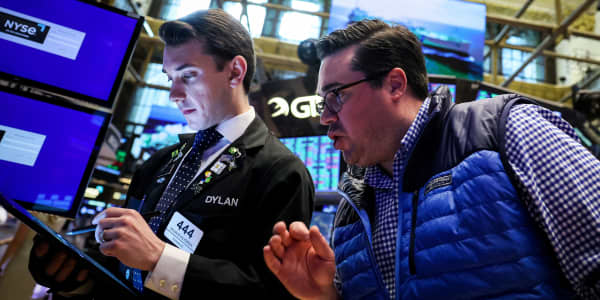The election authored a new bullish story for stocks.
The dust-jacket summary goes like this: "Donald Trump has led a Republican takeover of Washington, which opens a clear path to a quick deregulation push, dramatic tax cuts for upper-income households and companies, and a debt-enabled infrastructure binge. Buy industrial, financial and healthcare stocks, and sell your bonds."
Investors caught flat-footed by the vote rushed to buy into the narrative, as the market launched a violent repositioning along several axes: from safe, stable stocks to cyclical, risky ones; from over-owned bellwethers to neglected also-rans; from low-growth/deflation hedges to reflation/inflation plays.
Now the crucial question is whether this story can be believed - at least in the uncomplicated version reflected in the first three days of trading under President-elect Trump?
No doubt jarred by the unanticipated surge in stocks and selloff in bonds after the reflex 5 percent selloff Tuesday night, market commentators are grasping for metaphors to characterize the new regime.
Eric Peters, chief investment officer of alternative-investing firm One River Asset Management, cited investors likening the Trump win to the ascendance of Haruhiko Kuroda at the Bank of Japan or Mario Draghi at the European Central Bank. These shifts immediately altered the equation for monetary policy and markets rushed to account for the radical shift.
A more common association has been made with Ronald Reagan's election in 1980, though the profile of the new president and the vastly different economic and market backdrop today severely limit the effectiveness of this comparison. Stocks valuations were painfully low, interest rates crushingly high and monetary policy tight then, the virtual opposite of today.
Still, billionaire investors who were previously frustrated with the central-bank-driven markets of recent years quickly struck a hopeful stance on Wednesday. These include Stanley Druckenmiller, Carl Icahn, and Canada's Prem Watsa of Fairfax Financial who each said they had sold gold and Treasuries, taken off downside stock hedges or bought shares outright.
The markets' breakneck re-pricing of fiscal policy, growth potential and inflation is more familiar and comfortable to many investors who came of age in the '70s and '80s, when these forces allowed the Big Money to lay bets on one sector over another and to handicap the interplay of the economic cycle and Fed policy. Last week's stark rotation from bonds to stocks and from defensive to offensive sectors felt like old times to this crowd.





